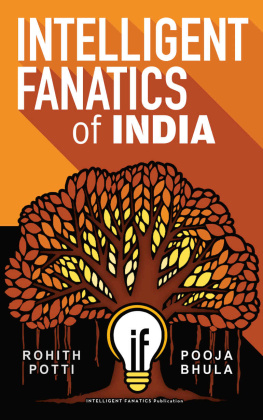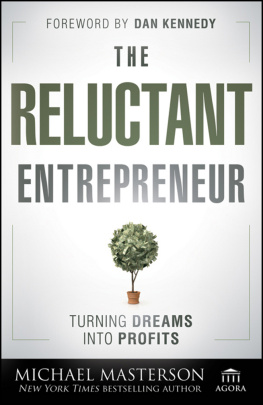Intelligent Fanatics of India
Rohith Potti & Pooja Bhula
Copyright 2019 by Intelligent Fanatics LLC
All Rights reserved.
Published in the United States by:
Intelligent Fanatics LLC
35 Bank Street
Newfield, NY 14867
www.IntelligentFanatics.com
Cover Design: Carl Moebis
Disclaimer: We may/may not have positions in the companies mentioned in this book. Nothing in this book is a stock recommendation. We are not SEBI registered investment advisors. Our Intelligent Fanatics Model Studies and Articles are meant to retell the stories and strategies used to create exceptional businesses so that we can learn from them.
Table of Contents
Intelligent Fanatics Origin
Dr. V (Aravind Eye Care)
Introduction
The Mahabharata is an ancient Indian epic that recounts the tale of the Bharata dynasty. Through richly woven stories, it conveys complex spiritual, ethical, political, and philosophical constructs. The scope of this epic is evident in that the revered text of the Bhagavad Gita is just one among the principal works that form part of it.
One beautiful story in the Mahabharata is that of Eklavya.
Ancient India was divided quite rigidly by the caste system. The population was separated into four classes: Brahmans (priests, scholars, and teachers), Kshatriyas (warriors and rulers), Vaishyas (traders and businessmen), and Shudras (laborers and service providers). A persons caste was determined by the family in which he or she was born; thus, a trader could not aspire to become a warrior, and it was a sacrilege for a Shudra to aspire to pursue the profession of another caste.
Eklavya, the legend goes, was the son of a Shudra and was consumed by the desire to learn archery. His family stayed in the forest near the gurukul of the great teacher Dronacharya (a combination of the name Drona and Acharya, the honorific for a teacher). The gurukul system was an ancient system of residential education, where students spent years in training under a guru, at his home. Dronacharya was the most renowned teacher at the time and was the teacher of the royal family of the Kingdom of Kuru.
Filled with the keen desire to master archery, Eklavya approached Dronacharya and asked to be accepted as his pupil. Upon learning that Eklavya was a Shudra, the Acharya refused. Heartbroken, though not willing to give up, Eklavya returned home. He built a statue of Dronacharya and began training on his own. He practiced diligently for years under the watchful eyes of his guru. Once, when Dronacharya was passing through the forest with his prize student Arjuna (a prince of Hastinapur), they witnessed Eklavya performing incredible feats of archery. The Acharya observed that Eklavya was better than even Arjuna, who was the gurukuls most accomplished student.
The story has an unfortunate ending, though. Amazed by Eklavyas skill, the Acharya asked Eklavya who had taught him archery. Eklavya pointed to the statue that he had built. This stunned the great teacher but also put him in a fix. He had promised to groom Arjuna to be the best archer in the world. The gurukul system followed the ancient tradition of guru dakshinaan offer of gratitude from the student in return for his training. As a guru dakshina, Dronacharya asked Eklavya for his right thumb, the vital finger for any archer. Eklavya did not hesitate; he cut off his thumb and offered it to his teacher.
But the story goes that the loss of his finger did not stop him. He went on to master archery again, despite this handicap.
It is difficult to fathom the obstacles faced by Eklavya in his journey. According to the law of the land, he had no right to dream about becoming an archer because of the caste to which he was born. The considerable psychological barrier and cultural conditioning (of generations) that he faced right from his birth would seem insurmountable to many. But that did not stop him from approaching the best teacher in the land. He was categorically refused by the guru he revered. That did not stop him either. He built his own bow and practiced till he became better than the best student of the best teacher in the country.
So what does the story of Eklavya have to do with intelligent fanatics?
Our goal in this book (and through our website) is to help enable all the budding Eklavyas out there. We want to enable and fan the passion for mastery among our readers. Like Eklavya in the Mahabharata, we may not have direct access to the best teacher(s) in the land; we may not always have direct access to the intelligent fanatics. But there are other resources that serve just as well, or maybe better. Our goal is to tease out the patterns of quality leadership, business, and mastery, and share them with the world.
And we promise we wont ask for thumbs or equivalents.
In fact, we would invert and go the other way with our demand: we insist that you spread the knowledge that you think can help others, as far and as wide as possible. Because few things have such an asymmetrically exponential effect as knowledge.
Chapter 1
Intelligent Fanatics Origin
Charlie Munger first came up with the term intelligent fanatic. He referred to intelligent fanatics as human beings so talented that they can do things that ordinary skilled mortals cannot. He added, These people do come along [in business]and, in many cases, they are not that hard to identify. If they have got a reasonable handwith the fanaticism and intelligence and so on that these people generally bring to the partythen management [in business] can matter much.
In his various talks, Munger has touched upon the concept of intelligent fanaticled organizations, citing the examples of Les Schwab, Kiewit, Costco, Glenair, and several others.
Let us begin with the fundamental question: What characterizes an intelligent fanaticled organization?
Well, they endure for long periods, and in many cases they dominate their sphere of business.
This naturally raises the next question: What feature or features allow them to endure?
The essence of the multidisciplinary approach to thinking espoused by Charlie Munger is to learn about the big ideas from various disciplines. If a concept or approach has been true from time immemorial in the fundamental sciences, then there is a high probability that the concept might end up being true in human systems like businesses or armies or others. Let us apply this framework here.
To answer the particular question of what features characterize the domination of an organization, let us first try to find an explanation for why human beings dominate the earth. Maybe if we understand why our species has dominated for such a long time, despite being nowhere near as physically strong as many other mammals, it might help us to understand why certain businesses dominate and endure.
To answer this new question, we turn to the brilliant book Sapiens by the Israeli professor Yuval Noah Harari.
The most common answer given to the question about human beings dominance is that we have bigger brains, are more intelligent, have strong social structures, and developed the ability to tame natural forces like fire.
Humans are quite immodestly impressed by the superior intelligence we possess in relation to other animals, and it seems a no-brainer that this evolution of larger brains led to our deserved superiority. This intelligence, coupled with our ability to walk on two limbs (rather than four), enabled us to use our hands elegantly and to develop tools. However, our large brains and an upright gait came with its set of disadvantages, particularly for the female members of our species. An upright gait required slimmer hips, just when evolution was resulting in larger brains in babies. Women who gave birth earlier fared better and could have more children; but earlier birth also meant that human babies are, on average, more helpless after their birth than the offspring of other animals. Their vital systems are considerably underdeveloped compared to that of other animals. A human child requires years of support and hand-holding before it can survive on its own.
Next page












